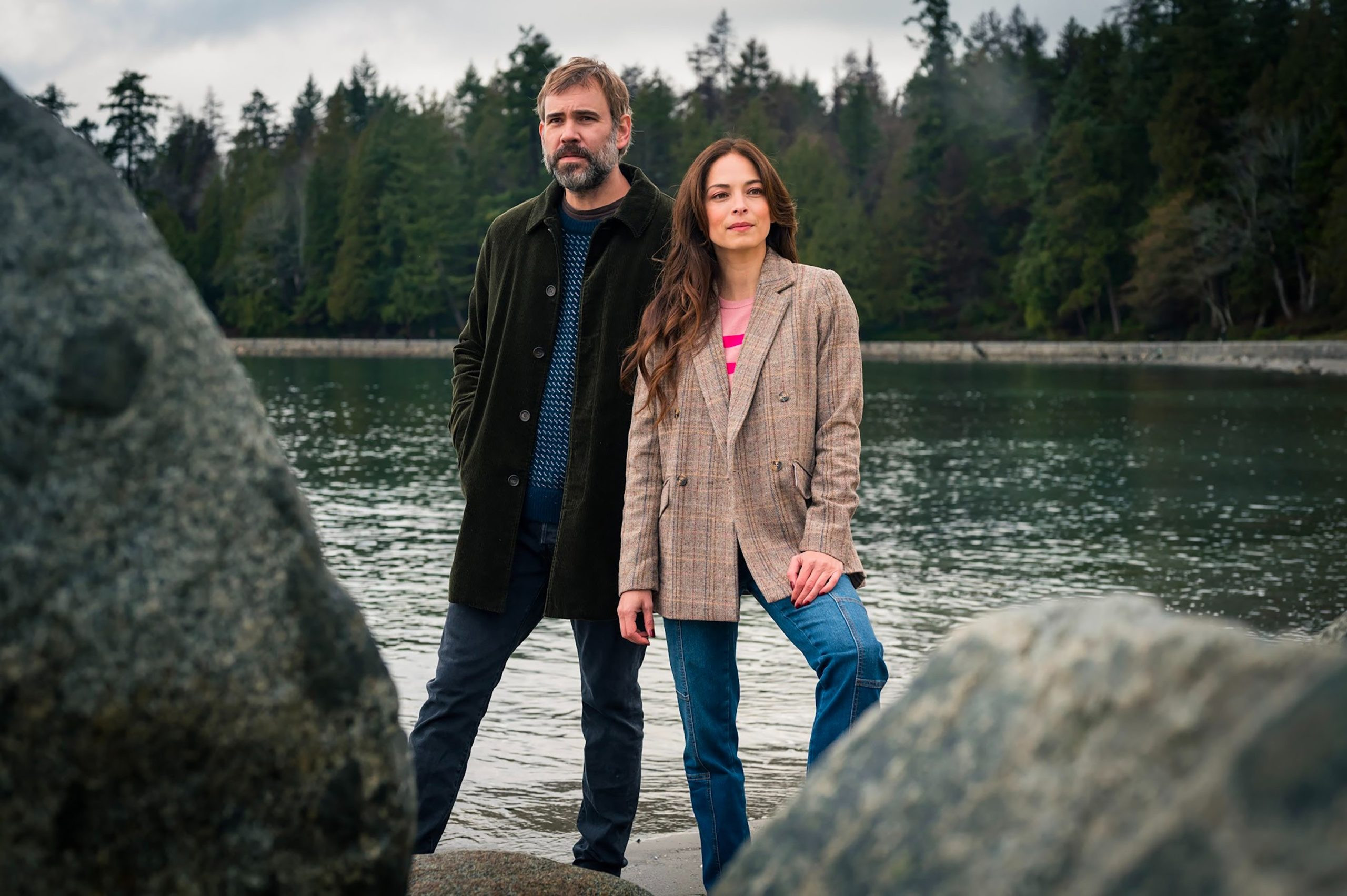There is something comforting about going back to some of the most classic genres. Based on the Alberg and Cassandra Mysteries by L.R. Wright, and adapted by Ian Weir, Fox‘s newest drama “Murder in a Small Town” — in the single episode provided to critics — combines mystery and romance for a perfectly enjoyable experience. Set in the gorgeous coastal British Columbia community of Gibsons, the no-frills series follows new-to-town police chief Karl Alberg (Rossif Sutherland), who has a special knack for details and solving the crimes plaguing the town and its residents. Karl doesn’t expect to fall for Cassandra Lee (Kristin Kreuk of “Smallville”), a librarian whose bold attitude unnerves and excites him. Charmingly predictable with a sliver of edge, the show is an all-inclusive crowd-pleaser (again, through all of one episode).
“Murder in a Small Town’s” 90-minute premiere opens on a seemingly quiet day in Gibsons. An elderly man, George Wilcox (special guest star James Cromwell), is seen watering his plants. Another gentleman is spotted dropping an item off at a neighbor’s house. Elsewhere in the interior of a home, a loud argument is heard. Shortly thereafter, an unseen assailant clobbers a man over the head, and watches blood pour out of his wound as the man falls dead to the floor.
Elsewhere, a determined Cassandra enters a restaurant for her date with Karl. The pair initially connected on a dating app, but this first in-person rendezvous goes off without a hitch. Viewers learn that while Karl is in his post-divorce era, Cassandra wants to keep things fun and casual. Though the duo are just meeting in real life, their banter is compelling, adding needed depth to the cliché-filled plot.
Almost as soon as the date concludes, Karl finds himself at the scene of the murder. He learns the deceased victim is Carlyle Burke (R.H. Thomson), a longtime Gibsons resident who wasn’t all that beloved. Karl’s team, Corporal Edwina Yen (Mya Lowe), Sergeant Sid Sokolowski (Aaron Douglas) and Constable Andy Kendrick (Fritzy-Klevans Destine) are all capable. However, the police chief has a knack for spotting the tiny clues others have overlooked. In what feels like a more retro style of filming that includes whip pan shots, the audience is compelled to examine the crime scene through Karl’s discerning eyes. Almost as quickly as he scans the room, he notices something is amiss.
The crimes depicted in “Murder in a Small Town” — in the one episode — aren’t massive unsolvable enigmas. In fact, with such obvious hints, any viewer paying a fraction of attention will likely solve the case before the episode’s midway point. However, this cheesy familiarity makes the series fun even in the face of some truly baffling writing choices (specifically some bizarre mentions of race).
Karl and Cassandra’s budding affair centers the show. While the couple have an intense connection, their contrasting personalities — his gentle and patient and hers, no-nonsense and brash — add to the narrative conflict as they get to know one another. The series also has no interest in the slow burn. A contentious disagreement toward the end of Episode 1, “The Suspect,” illustrates the would-be couple’s opposing worldviews, highlighting possible discord in the future.
Despite its hokeyness, “Murder in a Small Town” is entertaining. Its cozy rhythm is why shows like Netflix’s “Virgin River” are such hits. Tension, both sexual and otherwise, between Cassandra and Karl will entice viewers to continue tuning in if only to see how their relationship blossoms. Moreover, though each episode focuses on a different crime, questions surrounding Karl and Cassandra’s pasts offer “Murder” much-needed texture.
“Murder in a Small Town” isn’t revolutionary. From the romance to the all-too-obvious murder cases, the series has no interest in being clever or slick. However, because it knows exactly what it is and doesn’t try to do anything else, the show hits the nail on the head as a pleasing procedural with a 1990s-esque feel.
“Murder in a Small Town” premieres Sept. 24 on Fox, with new episodes airing weekly on Tuesdays.
About a year ago, Rossif Sutherland was talking to his father, the acclaimed actor Donald Sutherland, about the lead role Rossif had just landed: compassionate sheriff Karl Alberg, in the new Fox/Global/STACK series Murder in a Small Town. “As I started to describe Karl as I saw him, my dad said, ‘Wait, what is this? I know those books,’” Sutherland recalled in a video interview last week from his parents’ home in Quebec’s Eastern Townships. Turns out Donald, who died on June 20, was attached to play a villain in a (never-made) film version, 30 years ago.
“There was a weird serendipity to it all,” Sutherland says. “I became an actor because of him, he was ill, here was possibly my biggest break, and it was something he’d touched three decades ago.” (The eight-episode series, based on novels by Saskatchewan-born Laurali Rose “Bunny” Wright, arrived Sept. 24.)
At first acting was the thing that separated father and son; later it was their deepest bond. Sutherland was born in 1978. During the first 15 years of his life, Donald made 40 films, including Animal House, Ordinary People, Bethune and JFK. “My father was away most of the time when I was a kid,” Sutherland says. “Film was his other family, and it was very much his home. He was a mystery to me. From a young age, he existed for me as a two-dimensional experience, on the big and little screens. I never really saw my dad, I saw his characters. Now he’s passed away, but as a child I saw him die so many times.”
Though Sutherland is handsomer than his father, he inherited his excellent hair (shaggy and graying in all the right ways), his height (6′5″), his mesmerizing, lion-purr voice (though Rossif’s is tinged with the French accent of his mother, the actress Francine Racette), and his graceful habit of modesty, of not taking up space. While studying philosophy at Princeton University, Rossif made a student film; after Donald saw it he told him, with tears in his eyes, that acting was his calling.
“Acting has been a tricky journey for me,” Sutherland says. (Indeed, several of his projects just didn’t click, including the recent Prime Video series Three Pines, based on Louise Penny’s mysteries.) “But my father was incredibly generous with me, very supportive and loving. We got to play catchup because I chose to act. We got to, very intimately, talk about what we had in common: dedication to storytelling, curiosity about human beings and how to use that curiosity to piece together characters. I think the reason I’ve stuck to acting is me trying to understand my dad. He taught me the goal of any artist: to try to be truthful. It’s an impossible exercise, but you keep trying.”
On its surface, Murder in a Small Town is an old-school, crime-of-the-week network procedural. Alberg, recently divorced, hoping to reconnect with his teenage daughters, leaves big-city detective work to become the sheriff of Gibsons, a picturesque hamlet on the Sunshine Coast – it’s shot in B.C, but the vibe is Washington state – where a lot of folks wind up dead. It’s fascinating, however, to watch Sutherland do everything he can to make it a character study.
First, Alberg eschews a cop uniform, wearing instead a suede coat, cardigans, sweaters, boots. (Sutherland built a backstory for each item.) “Karl doesn’t want to intimidate; he’s not flashing his badge or showing off his gun,” he says. “Though his ex-wife would say, ‘Because you don’t wear a uniform means you’re always in uniform.’ He wants to make people forget he’s a police officer, so he can get the truth out of them by mere conversation, humanity, human curiosity.”
Second, Alberg is modest, open and unafraid of silence. Like Sutherland. “I’m interested in the idea of a cop who’s vulnerable, who can cry, who’s not afraid to be sensitive,” he says. “I don’t speak very much, because I’ve already heard what I have to say. That goes for him, too. Silence is an extraordinarily powerful thing. Many people will try and fill it with words, and Alberg wants people to talk. Silence also makes people realize you really are listening. It’s quite a rare thing in a TV procedural to have room for silence.”
As well, Alberg has a heightened ability to see: what’s out of place or missing in a crime scene, but also to really see his new love interest, Cassandra (Kristin Kreuk, Smallville), the local librarian and arts ambassador. Their tentative steps toward a realistic, middle-aged relationship are the heart of the series.
“We all want to be noticed, seen, understood,” Sutherland says. “We bounce words back and forth to try to communicate. But in really observing each other, sometimes there’s the miracle of love. In Karl and Cassandra’s case, it’s not the notion of love we’re usually sold, of two people becoming one. With them, it’s about coexisting together, helping each other become whole, but independent of each other.
“My father used to say, ‘If you can explain love, then love is no longer love. Love exists where there is no definition.’ My mum used to say, ‘You end up loving people because of the quirks, the prickly things that an outsider might consider flaws.’ That space of intimacy, where you actually are seen – where you’re naked no matter how many clothes you’re wearing, and you’re comfortable being naked – that’s a beautiful, extraordinary thing.” (This is how Sutherland thinks, and talks, all the time. It’s pretty swoony.)
But here’s the nugget, the conscious/unconscious connection, that most unites Alberg to Sutherland, and Sutherland to his father: Alberg’s work came between him and his children, and now he’s trying to fix that. “Karl spared his daughters the cruelty of the world he saw in his job,” Sutherland says. “But by sparing them, there was an unhealthy silence, which turned into distance and seeming indifference.” That’s a silence he longs to break.
For the last few years of his life, Donald wanted to act, but his health was such that he couldn’t do it on his own. So his son helped him: “I really wanted him to play, because it’s what made him happy, what made him feel like himself. I’m so happy I had the time to do it. It may have been my greatest gift.”
Asleep in his parents’ Quebec home, Sutherland “would wake in the middle of the night and hear my dad speaking. The first time, I thought, ‘Poor man, he’s lost his mind.’ I went to his room. He was sitting up in bed. He hadn’t lost his mind – he was running his lines.

















